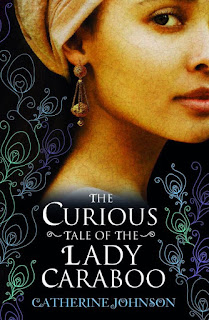 Sexually assaulted on the Bristol road, a dark-skinned young lady has had her fill of suffering. Broken hearted, abused and mother to a dead child, she has suffered immensely. Instead of choosing suicide, like many ruined, impoverished girls of the 19th century, Mary chooses to disappear. She vanishes, leaving instead the Lady Caraboo- a haughty warrior princess; fearless, exotic and fascinating.
Sexually assaulted on the Bristol road, a dark-skinned young lady has had her fill of suffering. Broken hearted, abused and mother to a dead child, she has suffered immensely. Instead of choosing suicide, like many ruined, impoverished girls of the 19th century, Mary chooses to disappear. She vanishes, leaving instead the Lady Caraboo- a haughty warrior princess; fearless, exotic and fascinating.Taken in by the Worrals, a prominent middle class family hell bent on integrating themselves into society, Caraboo is befriended by daughter Cassandra, reader of romantic novels and general Victorian tween. She is obsessed with dresses and ribbons and dances, and the apple of her eye is currently her brother's boorish friend Edmund, who is something of a womanising brute. Mrs Worral is a keen anthropologist and is fascinated by Caraboo, who she assumes is some sort of Eastern Princess based on her headwrap and her proud, defiant carriage. What starts off as a quick way to secure a bed for the night becomes a larger deception as Caraboo goes along with it; making up a language, crafting a bow and arrow and shooting pigeons, climbing trees and praying to her made up, exotic gods. She is a thorough, gifted actress and master of deception, a true con artist. While her actions could be seen as wrong, the reader knows that she doesn't mean any harm by it, and is just trying to escape herself and her meagre lot for a while. Mary is a stronger person when she is Caraboo- she is brave and powerful, and more importantly, she has no history. No lost child, no broken heart.
Caraboo is authenticated by "experts", men of science and experience who are no more real or genuine than the pretend Princess- proof that our reality is built on shaky foundations and that the Princess, though a fraud, is not gaining by her deception. She is an honest forgery, where these experts are not. There's two romantic sub-plots woven into Caraboo's exhibition and attempts to validate or expose her; Cassandra's dreamy romance with the in-keeper's son; a dalliance that Caraboo knows can never end happily. Mary also plots something of a deliberate bewitching of Cassandra's brother Frederick- aiming to avenge, even slightly, the countless women all over the world that are drawn to society men with gifts and promises- then ruined. She aims to get him to fall hopelessly for Caraboo, then disappear, breaking his heart in payment to all the ruined women. Needless to say, it doesn't go to plan.
TCTotLC is an enjoyable historical novel that I think will be brilliant for fans of Tanya Landman and Mary Hooper. The author has built a beguiling novel around the bones of a real historical mystery. I loved the how the book questions identity, how do we tell what is real when everyone is playing a role in society. Though Cassandra and Will's infatuation doesn't add a huge amount to the plot, I thought Caraboo and Fred made a much more interesting pairing. Fred, previously shown to be quite the regular at brothels around his school, is much improved by his relationship to Caraboo. He becomes more thoughtful, more caring- it's the real Frederick showing through the laddish nightmare. In his case, the fiction really is better than the truth, and it's the fiction he tries to desperately to hold on to.
My favourite aspects of the novel is when it begins to question gender roles, particularly via the Phrenologist fool, constantly spewing facts about the tiny female brain. Frederick too comes to realise the disparity of his own future compared to that of his sister. Caraboo demonstrates how capable women can be, and it's a surprise to them all. Also, I liked that an English set historical novel had a POC as their main character. I loved this attempt to redress that lack of diversity.
Tough it's a very well crafted, enjoyable read with an appealing romantic twist on a fascinating true story, I'm not sure it has the same impact or relatability as some of the other YA Book Prize shortlisted titles. Caraboo is a wonderful creation and an engaging character.
Tough it's a very well crafted, enjoyable read with an appealing romantic twist on a fascinating true story, I'm not sure it has the same impact or relatability as some of the other YA Book Prize shortlisted titles. Caraboo is a wonderful creation and an engaging character.

No comments:
Post a Comment